Why Do My Brakes Squeak When I First Start Driving?
Inconsistent contact of brake pads with the rotor, rust buildup on brake rotors and improper bedding-in of new brake are the most common causes of brakes squeaking when you first start driving. Moisture accumulates on brake rotors overnight that builds up rust and corrosion on the brake rotors. Due to condensation, brakes will keep squealing until warmed up. When you press on the brakes in the morning, the pads rub against the rust on the surface of the rotors, causing a squeaking sound. Other potential causes include worn brake pads, insufficient lubrication between contact points of brake pads and caliper bracket, or debris stuck in the caliper sliding pins.
The brake pads can make an unpleasant, loud noise when you start driving. This noise goes away after the brakes get hot.
The noise is annoying to hear. It can also make you worry. But often it is not a big problem.
Let’s look at why the brakes squeak at the start. And how to find the cause. Also, what you can do to fix it.
You can also read my article on the causes of brakes squeaking when stopping slow.
If you want to get a quick answer, you can also chat with a virtual mechanic for free.
I’ve developed an interactive tool for you all to troubleshoot car issues. It guides you through easy steps to identify the problem. Don’t forget to try it.
Below, I have briefed you about the different components of brakes that will help you. If you have preliminary knowledge, you can skip to the causes section.
In the last section, I’ve included comments from forums where users share firsthand experiences of brakes squeaking when first starting driving. Be sure to check out that section for real insights.
- Brakes often squeak when first driving due to moisture buildup overnight causing rust on rotors. Goes away once brakes warm up.
- Insufficient lubrication between brake pads and caliper can cause vibration and squeaking until lubricated.
- Contaminants inside caliper slider pins can cause them to stick, making noise when first driving. Clean and lubricate pins.
- Loose bolts on brake caliper hardware can cause misalignment and uneven brake pad contact, causing noise.
- Debris stuck in brake disc makes grinding sound initially when pads rub against it. Goes away at speed.
- Bad serpentine belt can cause squeak at start, especially when cold. Expands and quiets down when warmed up.
What is My Personal Experience With Brakes Squeaking Until Warmed Up?
My cousin drives an older Civic that would make a loud screeching noise when first applying the brakes in the morning. I inspected the rotors and saw a rust film had developed overnight. Using sandpaper, I smoothed the rotor surfaces then cleaned out debris from the caliper slider pins. After lubricating the pins, the morning brake squeal went away.
Overview Of Working Of Disc Brakes In Vehicles
Before proceeding to the causes of brake squeaking when first starting driving, it is important for you to understand the functionality of each component of disc brakes so that you can troubleshoot the cause easily.
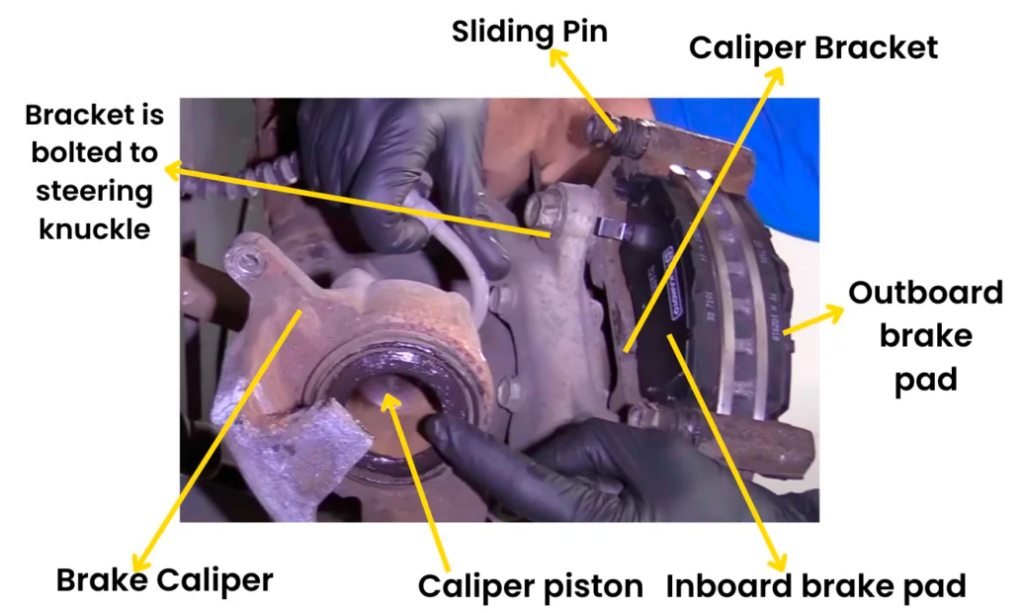
Disc brakes have some main parts:
- Caliper – This clamps the brake pads onto the rotor to stop the wheel from turning.
- Guide pins – These let the caliper slide back and forth evenly to wear the brake pads evenly.
- Caliper bracket – This connects the caliper to the wheel and suspension parts.
- Brake Pads – The brake pads press against the rotor to stop it from spinning.
- Brake Rotor – The rotor spins with the wheel. The pads squeeze it to slow the wheel.
How Disc Brakes Work?
When you press the brake pedal, brake fluid flows through the lines to the caliper. The fluid makes the caliper clamp onto the rotor. The brake pads rubbing the rotor make friction that stops the wheel.
Why the Bracket and Guide Pins Matter
The bracket connects the caliper to the steering knuckle and the suspension system. The guide pins let the caliper slide smoothly. That makes the brake pads wear evenly.
This video shows how the caliper moves on the pins:
Understanding the Pads
Each wheel has two brake pads in the caliper. When you hit the brakes, the brake pads grip the rotor to slow or stop the wheel. The inboard pad is closer to the car center. The outboard pad is farther away.
What the Rotor Does
The brake rotor spins with each wheel. When you brake, the caliper squeezes the pads against the rotor. This slows and stops that wheel.
How the Caliper Works
Pressing the brake pedal starts a chain reaction:
The pedal force goes to the master cylinder. It makes pressure by pushing brake fluid through small lines. The pressure matches how hard you hit the pedal.
The fluid flows through hoses to the calipers. The caliper presses the pads on the rotor.
At the caliper, the fluid pressure pushes the inboard pad against the rotor.
The pressure squishes the caliper piston, clamping that pad on the rotor. This pushes back against the piston.
So the whole caliper slides on its pins. This presses the outboard pad against the rotor too. The pads squeeze the spinning rotor to slow and stop it.
What Happens When You Release the Pedal
The piston seal gets squeezed when you brake. When you let up, it springs back to shape. This pulls the piston back, leaving a gap between pad and rotor.
The square edge seal stops the piston from rolling. It helps make that gap. The piston is O-ring shaped but has a square cross-section.
The brake caliper returns to its original position due to the springy rubber boots of the guide pins. The rotor may not be perfectly flat and can cause the brake pads to recoil when the pedal is released.
Air and centrifugal force around the spinning rotor also push back the brake pads. That’s why maintenance is key. Dirt and gaps in the brake pads affect this.
What are the Causes Of Brakes Squeak As You Start To Drive?
Here are the causes of brakes squeaking when you begin driving:
1. Moisture Buildup On Brake Discs Causing Squeaking
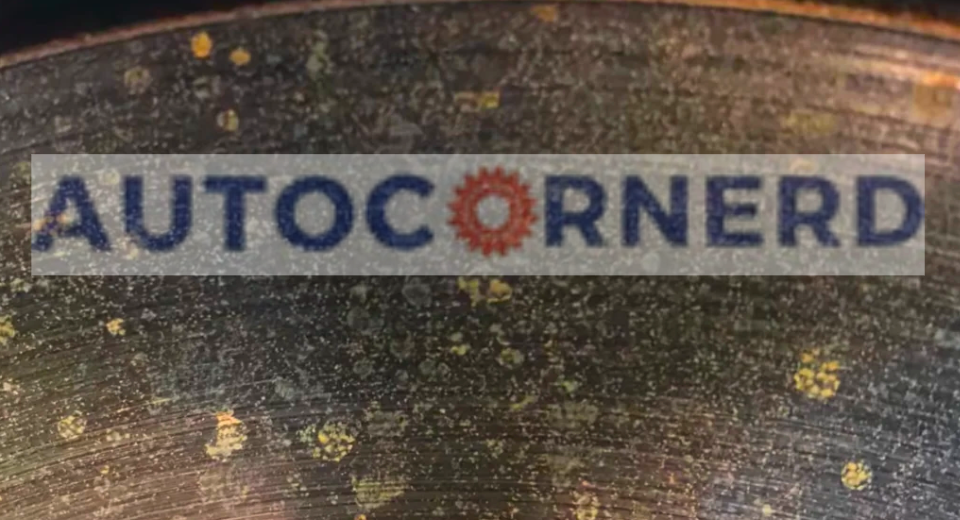
One common reason brakes can squeak when you first start driving is moisture building up on the brake rotor.
When moisture gathers on the rotor surface, it can cause rust to form. This rust buildup can make the brakes squeak when they first engage because the rust gets in the way of the brake pads working smoothly. The rust on the brake disc can also make the brakes feel less responsive or even get stuck.
Moisture building up on brake rotors is common for a few reasons. For example, if you drive in rainy, snowy, or humid conditions, or your car was parked in very cold wet weather, water and frost can gather on the rotors. Also, when you wash your car, water can seep into the brakes.
Since the rotor is metal, the moisture buildup will eventually cause corrosion and a rust layer will start forming on the brake disc.
Also, when the wet brake disc touches the brake pads, the water makes a layer between the pad and disc. This can cause the pad to stick to the disc.
This sticking can make the brake pads vibrate quickly, which causes noise. This is known as brake judder or brake squeal.
If the brake pads are metal, they can also rust and cause morning brake squeaking.
How to Fix Rust on Brake Rotors?
To avoid the unpleasant brake squeaking sound, a useful tip is to briefly drive your car before braking.
Doing this gives time for the brake discs to warm up, which helps dissipate any moisture potentially gathered overnight. This small step makes for a much quieter drive.
When squeaking is from moisture and rust buildup, the fix takes some steps.
First, take off the wheel, brake calipers, and pads. Then spray brake cleaner on the disc and scrub with a steel brush. Wipe it with a shop towel to remove rust and moisture.
It’s critical the disc is completely clean. Any brake cleaner left on it can damage the pad surface touching it.
Finally, if rust affected the pads too, use 180-200 grit sandpaper to sand the pad surface and remove any impurities.
2. Insufficient Brake Pad Lubrication Leading To Vibrations
Brake pads seat into the retaining clips of the caliper mounting bracket as shown in the figure below:
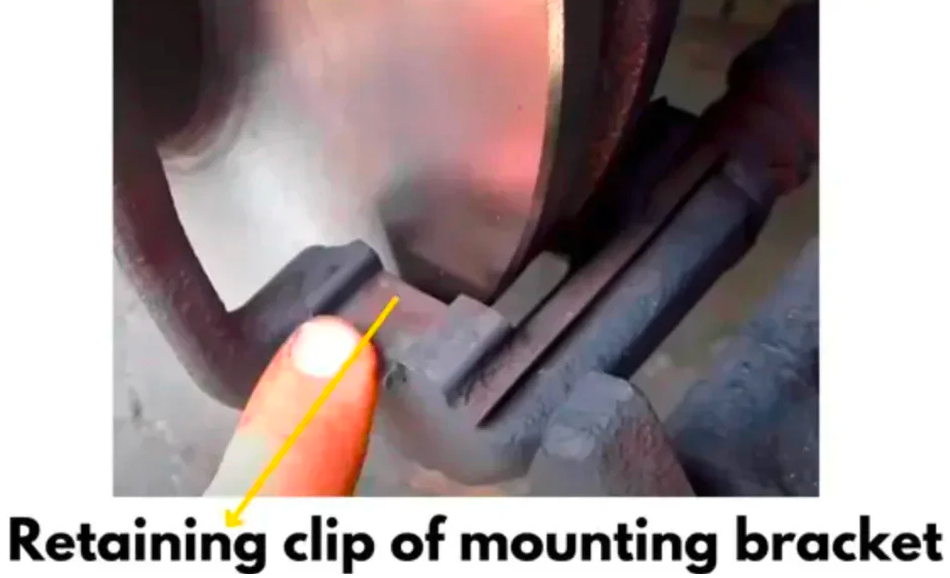
The brake pads need the right grease to slide smooth in the caliper. Without grease, the pads can’t glide good when you hit the brake pedal. This makes them vibrate against the rotor and squeak loud.
Over time, the clips that hold the brake pads in place get dirty. This stops the brake pads from sliding smoothly. Proper grease keeps the pads gliding quietly and easily. No grease means pad vibration and squeaky noises.
How to stop the brake pad noise?
Take off the brake pads. Put high-temp grease on the pad ends that touch the clips. This helps the pads slide easily with less friction. It makes the brakes work better and stops noise. I would use ATE Plastilube grease.
First clean any dirt and rust from the pads and clips before the grease. Dirt and rust mess up the grease and cause more problems later.
In the below illustration, I have indicated the ends (ears) of the brake pads that need to be lubricated. Please don’t apply grease on the friction plate of the brake pads as it will damage them.
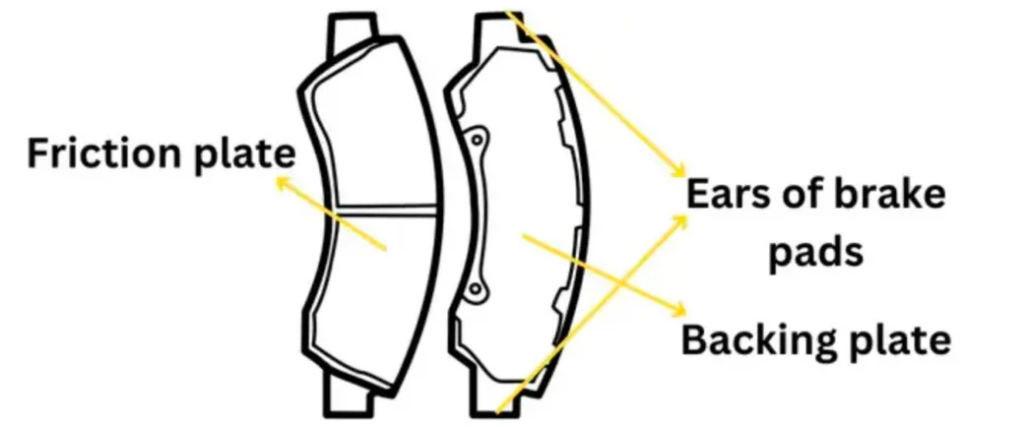
Also lube where the pad backing plate touches the caliper. This helps stop vibration and brake squeaks.
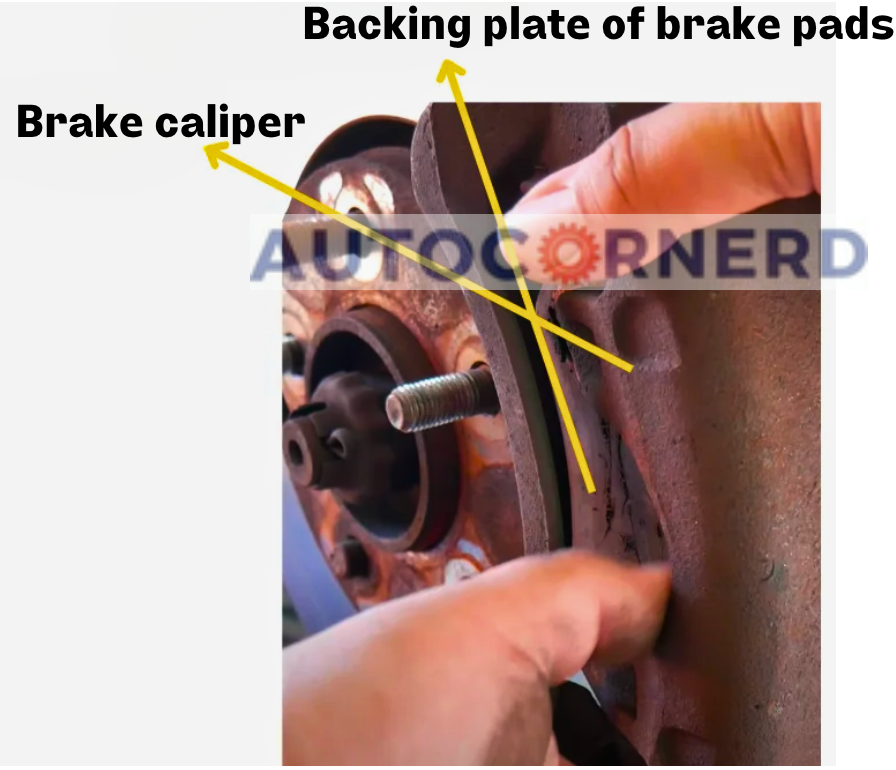
The below video is also quite helpful for lubrication of brake pads:
3. Contaminants In Caliper Slider Pins Jamming Brakes
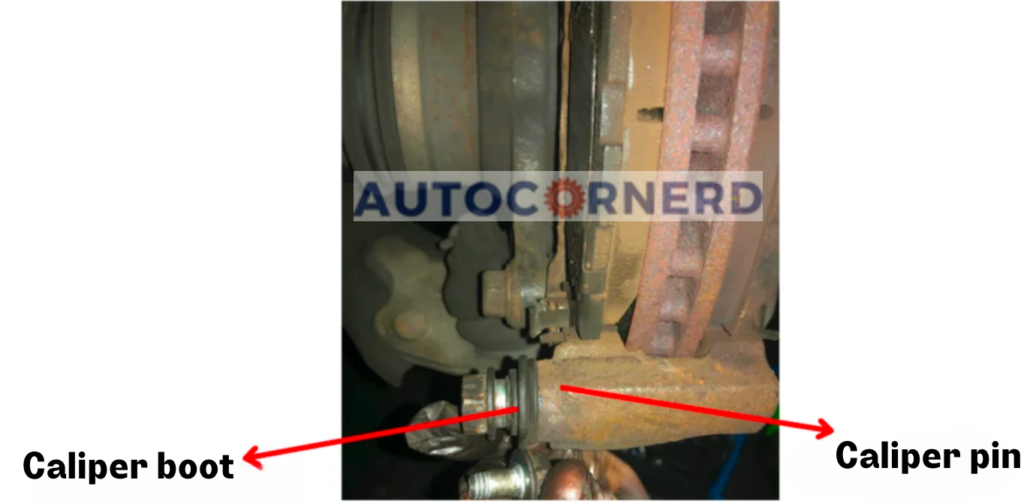
Caliper guide pins are an essential part of your car’s braking system. They are small metal pins that allow the brake caliper to glide back and forth on the brake pads.
In doing so, the caliper applies pressure to the brake pads, which then clamp down on the rotor to slow the car down. Caliper pins are lubricated and are enclosed in a springy rubber boot as you can see in the above illustration.
If the rubber boot of the caliper pins cracks, the dirt and debris can damage the caliper pins, due to which the caliper does not able to glide back and forth smoothly.
The main source of debris in the caliper guide pins is brake dust. As the brake pads wear down, they release brake dust that can accumulate in the pins. This dust can also cause the brake pads to vibrate and lead to a squeaking sound.
All of these substances can interfere with the movement of the guide pins and cause them to stick, resulting in brake noise.
Basically, when caliper pins stick, the brake pads partially remain clamped with the brake rotor. When you first-time drive a vehicle, the brake pad may need to break away from the rotor, resulting in the squeaking noise you hear.
How to fix a sticky caliper?
To keep your brake system in top condition, it’s important to perform routine maintenance which includes eliminating any debris or rust present on the brake caliper pin using a brake cleaner and wire brush. It’s also vital to remove any debris and dirt inside the caliper pinhole.
To clean the caliper bore, you should use a brush that fits perfectly. Dip a bore brush or cotton swab into the cleaning solution and carefully wipe the interior of the hole. After cleaning the bore, spray WD-40 into it.
Once you have finished cleaning, apply a high-temperature brake lubricant on the sliding pin to prevent friction and ensure smooth movement. For optimal results, it is recommended to use this particular lubricant.
4. Worn Brake Hardware Components Resulting In Noises
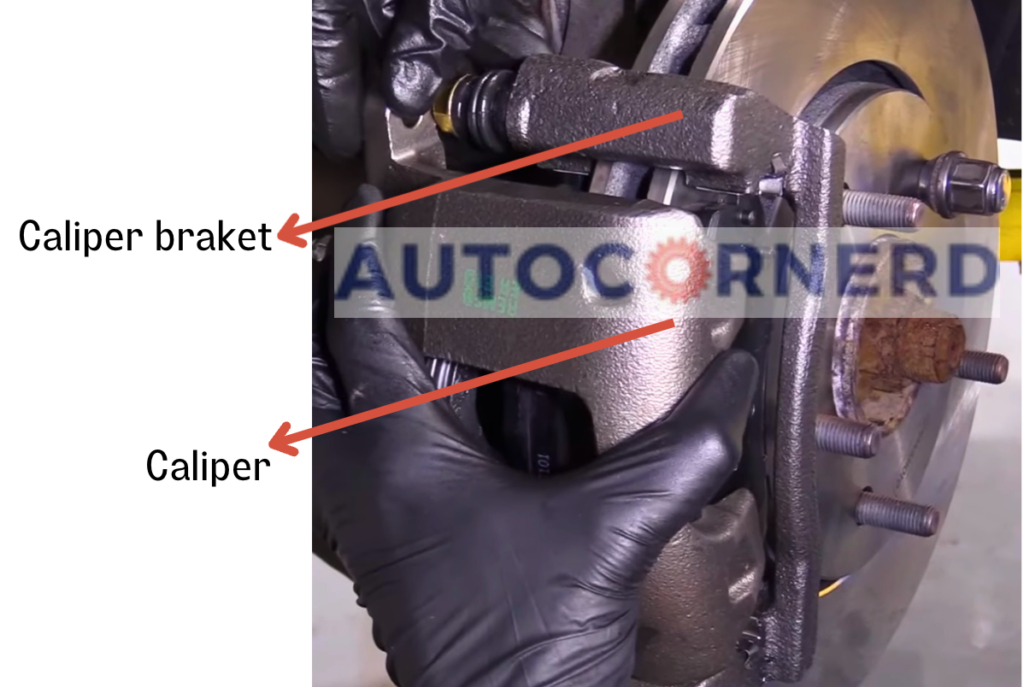
The brake caliper and the caliper mounting bracket are two important brake parts that get bolted and secured in their place.
The brake caliper gets bolted to the sliding pin of the mounting bracket, which then gets bolted to the steering knuckle.
It’s really important to tighten these bolts properly, following the exact torque requirements. Otherwise the bolts may loosen over time, creating safety issues on the road.
If the bolts on the brake caliper and mounting bracket get loose, the caliper cannot put enough force on the brake pads. This means uneven pressure on the brake disc.
Some parts of the brake pad will not touch the whole disc then. This can make the brakes squeak.
Also, loose bolts can make the mounting bracket shift around. This misaligns the brake pads with the brake disc.
When the pads and disc are not aligned, the pads won’t contact the disc fully when you press the brake pedal.
5. Foreign Particles Lodged In Brake Rotor Slots
One of the main causes of brake squeaking when starting to drive is debris or gravel getting stuck in the brake disc. This can cause a loud, high-pitched noise that can be quite annoying.
The debris or gravel can be anything from small rocks to dirt and dust. When they get stuck in the brake disc, they create a grinding sound as the brake pads rub against them. This sound can be quite loud and distracting, especially when you first start driving your car.
I have experienced this problem. Whenever I started my car and drove over a few distances, I would hear a low-pitched sound from the brakes. As the vehicle picked speed, the noise disappeared.
I was thinking that the brakes had an issue. I took the car to the mechanic. He removed the wheel and brake caliper. He found that there was a piece of gravel stuck between the brake caliper and the brake disc. After removing it, the problem was fixed.
6. Faulty Accessory Belt & Pulleys Transmitting Squeaks
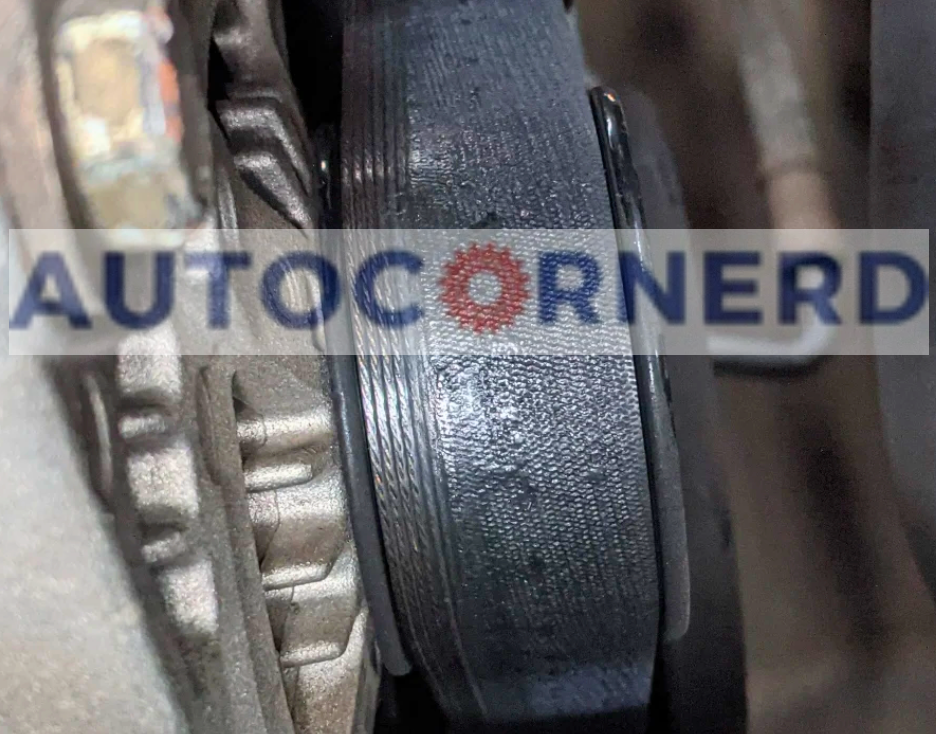
The squeaking noise from your car may come from the belts, even if you did not use the brakes. A damaged or glazed serpentine belt can make squealing noises, especially when cold. The belt’s surface is slick so it cannot grip the pulleys well.
When you start driving, the engine turns a drive belt that powers important parts like the alternator, air conditioner compressor, and water pump. This belt is usually rubber and fits tightly around pulleys in the engine. A spring-loaded pulley keeps the belt tight.
Friction happens when the belt first touches the pulley. This makes the rubber heat up and expand a little. As the rubber of belt expands, it can get tighter on the pulley. This reduces slipping or belt movement.
Is Brakes Squeal Until Warmed Up Normal?
Brake squeal when first using the brakes, especially on cold and damp mornings, is common and usually does not indicate any brake problems.
As brake pads and rotors cool overnight, moisture can condense on the surfaces leading to a thin layer of oxidation or rust.
This rust layer causes the squeal, which stops once enough heat is generated from braking. The friction from braking removes the rust layer.
Performance pads with high metal or ceramic content are more likely to squeak until up to operating temperature. Pads and rotors may also stick slightly until expanded by heat.
These are normal causes of initial brake squealing that goes away as the components warm up and expand.
However, if squealing continues well after the brakes have heated up, or gets progressively worse, it could signify more serious issues like glazing, improper bedding, contaminated fluid, caliper problems or incompatible pad/rotor pairings.
While some minor initial squeaking is normal, ongoing squealing after warmup requires inspection to identify and fix the root cause.
Final Thoughts
In summary, brake squeaking at the start of drive is often due to simple, fixable issues like moisture buildup or improper lubrication. This squeaking noise from the brakes can continue till they are warmed up.
However, it can also indicate more serious problems with worn pads, contaminated rotors, or loose components.
To avoid potentially hazardous situations, have your brakes inspected and serviced regularly. With proper maintenance and timely repairs, brake squeaking can be eliminated.
Driving should be a smooth, quiet experience, not an exercise in ignoring unpleasant noises.
Be proactive and address brake squeaks early, as they likely signify underlying problems needing attention. Safe driving depends on well-functioning brakes.
Some First Hand Experiences Shared By Users In Different Communities
Our team conducted research across various online communities, forums, and subreddits to gather user comments and opinions on “brakes squeaking sound as you start to drive”.
User 1 says:
In my Tahoe, the squeak was especially noticeable in cold mornings. It was just condensation on the brake rotors. I learned that it’s quite common and goes away after the brakes heat up a bit.
User 2 says:
Had a squeaking issue with my RAV4 right after starting. Turned out to be surface rust on the brake discs. It usually went away after a few brake applications. A quick check at the service center confirmed it was nothing serious.
User 3 says:
Experienced this in my Mustang. Initially thought it was normal, but it persisted. My mechanic found out the brake caliper was sticking. Fixed that, and it was smooth driving afterward.
User 4 says:
In my Outback, it turned out to be a small rock stuck between the brake disc and the shield. Removed it and the squeaking stopped. Always worth checking for debris.
Frequently Asked Questions
Do brake lubricants help with brake squeaks?
Yes, lubricating hardware helps components glide smoothly and quietly.
How often should brakes be serviced?
Brakes should be inspected every 5,000-10,000 miles. Follow manufacturer guidelines.
Are squeaky brakes dangerous?
They can indicate underlying issues needing repair. Have brakes inspected promptly.
How do I fix squeaky brakes?
Clean rotors, lubricate brake pad clips, check for worn parts. Replace as needed.
Do squeaky brakes mean I need new brake pads?
Not necessarily. Noisy brakes could just need lubrication. Inspect pads to see if worn.
Will the squeaking go away as I continue driving?
Yes, in most cases brake squeaking stops after driving for a bit as components warm up.
